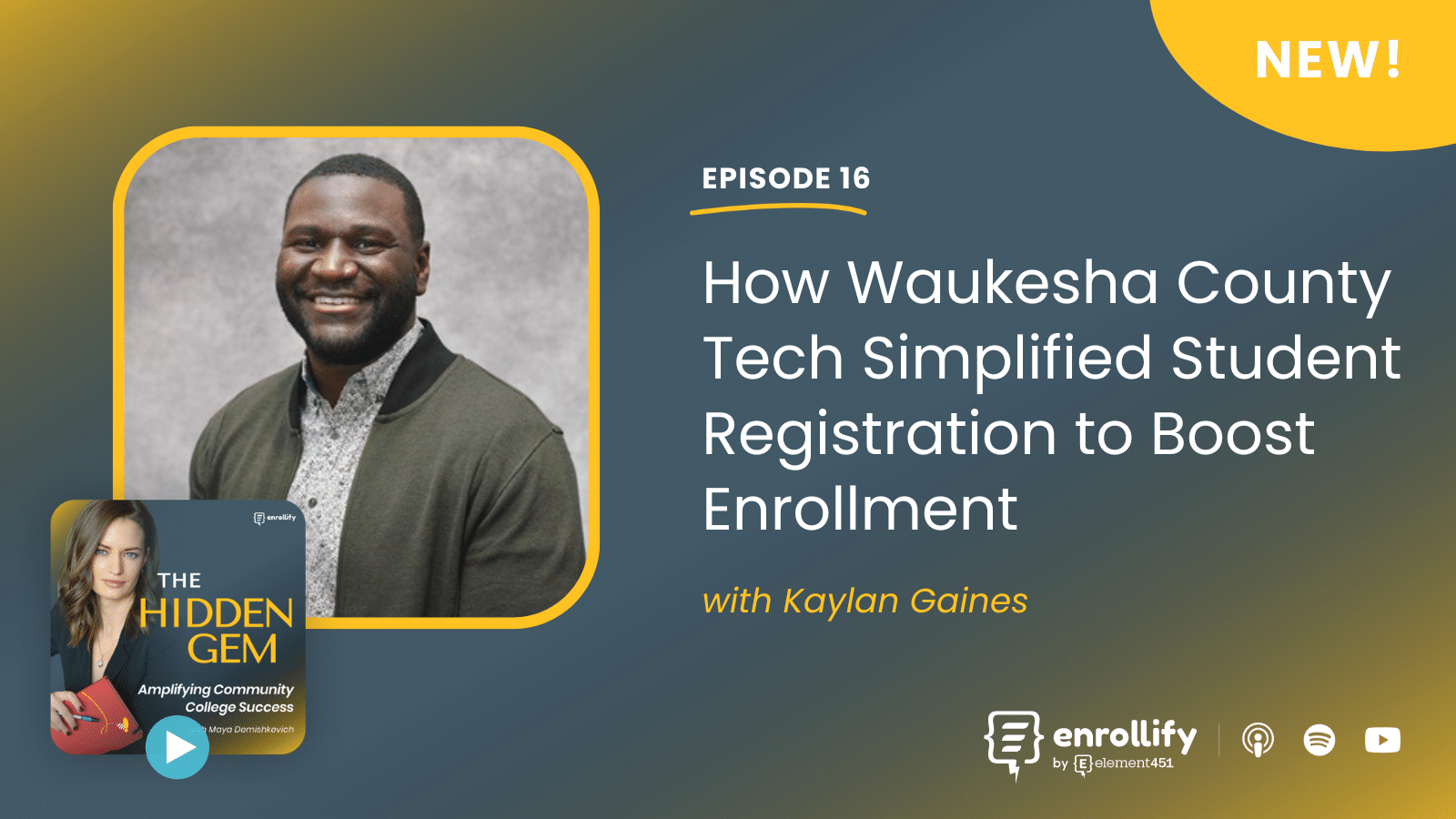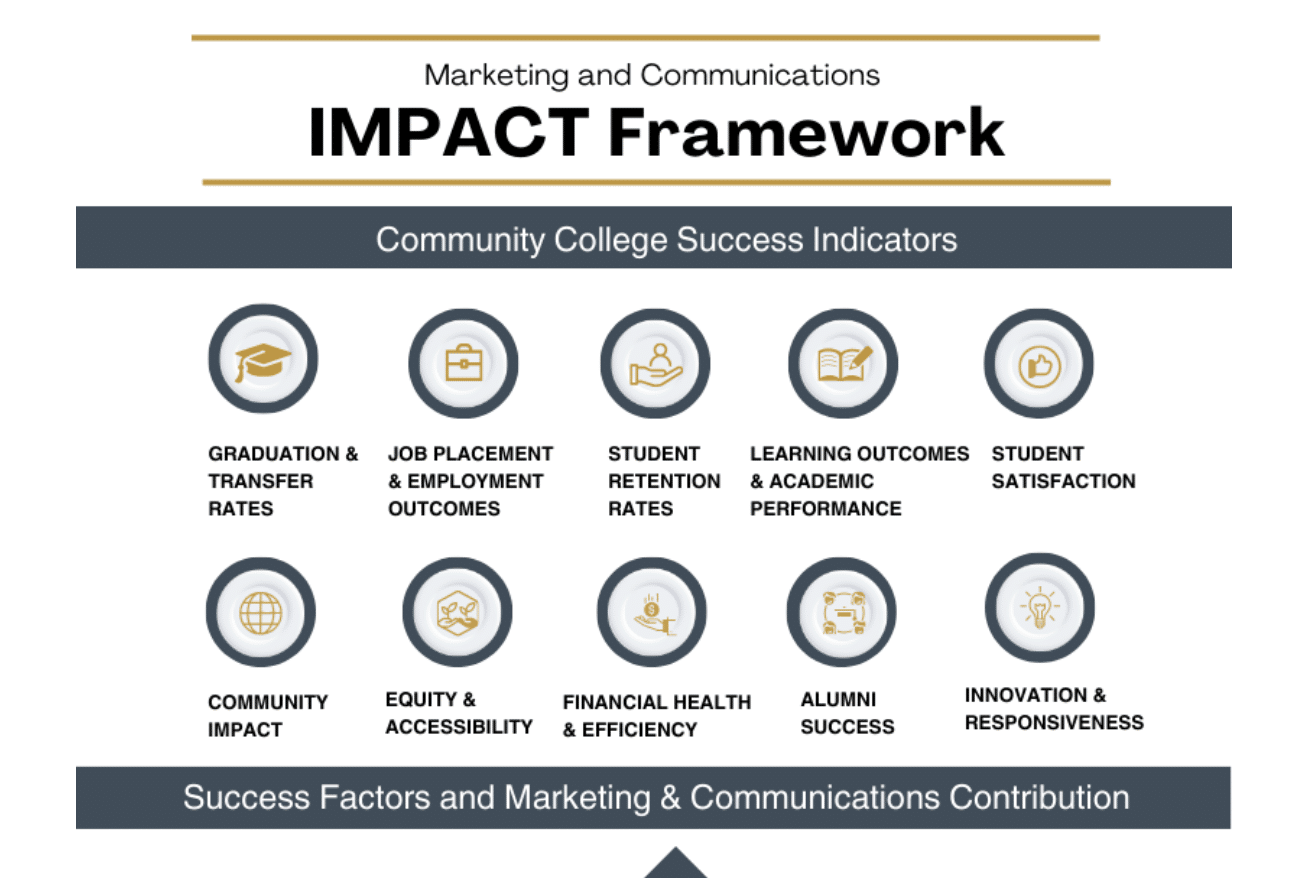Stay Ahead in Higher Ed Marketing
✅ Exclusive invites to FREE webinars
✅ Game-changing higher ed marketing insights
✅ Must-have resources to level up your strategy
Podcast
Episode 16

Episode Description
Guest Bio
Episode Transcript
In this episode of The Hidden Gem, host Maya Demishkevich speaks with Kaylan Gaines, Director of Recruitment and Engagement at Waukesha County Technical College, about the college's innovative approach to in-person registration events. Kaylan shares the story behind the creation of the "Admission Accomplished" event—a one-stop enrollment experience designed to simplify the registration process for students, streamline their journey, and ensure they receive the necessary support to start their college education confidently.
Key Takeaways:
Kaylan Gaines / Director of Recruitment and Engagement / Waukesha County Technical College.
Kaylan Gaines is a higher education professional with a decade of experience specializing in admissions & student recruitment. He currently is the Director of Recruitment & Engagement at Waukesha County Technical College located in southeastern Wisconsin where he develops and implements the recruitment strategy of the college's Enrollment Services unit and oversees recruitment operations and initiatives.
Podcast Transcript: "Making Registration Simple and Impactful" with Kaylan Gaines
Maya (00:01):
Welcome back to The Hidden Gem Podcast! Today, I’m thrilled to introduce Kaylan Gaines, Director of Recruitment and Engagement at Waukesha County Technical College. Kaylan will share how his college orchestrated highly effective in-person registration events to keep students engaged, excited, and motivated to complete their enrollment process. Welcome, Kaylan!
Kaylan (00:29):
Thank you for having me, Maya. I’m excited to chat with you today.
Maya (00:32):
Registration can be complicated. Meeting students where they are and providing options is critical. Let’s dive into what led you to create this in-person registration event. What challenges were you addressing?
Kaylan (01:04):
We noticed students often got stuck in the process—coming to campus multiple times for different steps like admissions, financial aid, or advising. During COVID, we transitioned to an online orientation, but students still felt disconnected and unsure about next steps.
We wanted to streamline the process and provide an opportunity for students to connect in person, ensuring they had the support needed to confidently register for courses and move toward their educational goals.
Maya (02:53):
That makes sense. You created an event called Admission Accomplished, which I love. Can you walk us through how it works, which offices are involved, and how the event flows from start to finish?
Kaylan (03:16):
Admission Accomplished is a one-stop enrollment event where students can complete all enrollment steps in a few hours. Here’s how it works:
The event involves admissions, advising, financial aid, career services, disability accommodations, mental health counseling, and student life.
Maya (05:33):
I love the cowbell celebration and how streamlined the process is. The checklist you shared with me was clear and concise, focusing only on the most critical steps. How did you refine it to that level?
Kaylan (09:59):
We started with a more detailed checklist but realized it overwhelmed students. Through feedback and iteration, we narrowed it down to five essential steps—three required for enrollment and two optional for community building. The goal was to make it short, sweet, and effective.
Maya (11:13):
How often do you hold these events, and how do they fit into your overall registration strategy?
Kaylan (11:39):
This past fall, we held four events—one each in May, June, July, and August—to align with course registration openings. We wanted to give students multiple opportunities to register, especially those who decide late in the process.
Previously, we held only two events in the summer, but expanding to four allowed us to reach more students and provide better support.
Maya (13:19):
What outcomes have you seen from these events? Any unexpected results?
Kaylan (13:38):
The results have been phenomenal. Attendance more than doubled—from around 50 students per event last year to 100–145 this year. Registration rates also increased from 72% to 83%.
A quarter of our total fall enrollment came from these events, demonstrating their impact.
Maya (15:25):
How do you promote the event? What’s been most effective in driving attendance?
Kaylan (15:49):
We target anyone in the funnel who has applied but not registered. Promotion includes:
Maya (18:07):
What advice would you give to other institutions looking to replicate this success?
Kaylan (18:17):
Streamline the steps as much as possible. Combine events like Admitted Student Day and orientation into one to reduce barriers for students. Convenience is key—students value efficiency and the ability to complete everything in one visit.
Also, know your audience. Technical colleges often serve students juggling work, family, and other obligations, so making processes convenient is critical.
Maya (20:24):
Have you noticed any differences in the types of students attending in-person events versus those registering online?
Kaylan (20:39):
Yes, in-person attendees tend to be slightly older, averaging 26–27 years old, and are often balancing work and other responsibilities. Younger students are more likely to bring parents or guardians to help navigate the process.
Maya (21:56):
What days and times work best for these events?
Kaylan (22:14):
We’ve tried different schedules and found that afternoons (1–5 PM) work best. We hold events on Tuesdays and Thursdays, with July events being particularly popular due to proximity to the semester start. Students will prioritize these events if they see the value in completing everything at once.
Maya (23:53):
Thank you for sharing your insights! I hope other colleges consider adding in-person registration events to reduce barriers and better serve students. Congratulations to you and your team on your success!
Kaylan (24:30):
Thank you, Maya! It’s been a pleasure to chat with you.
If you enjoyed this episode, I’d really appreciate it if you could help spread the word—whether by sharing it with your colleagues, posting on social media, or leaving a review. Your support means a lot!
At the heart of the podcast lies the IMPACT framework that answers a pivotal question: What is the role of marketing and communications in the success of community colleges? This framework answers it by showcasing how these domains are not peripheral but central to amplifying the success of the institution.

Copyright 2026 College Crusader, all rights reserved.
✅ Exclusive invites to FREE webinars
✅ Game-changing higher ed marketing insights
✅ Must-have resources to level up your strategy
